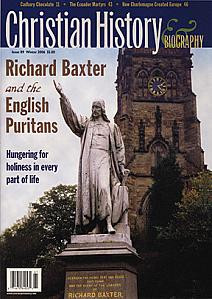Matthew Henry Devoted His Life to Understanding God's Word

Bible commentator Matthew Henry in his stout old age.
PHILIP HENRY, a non-conformist minister in England (a pastor who did not conform to the Church of England), loved the Bible and made it the centerpiece of family devotions. He followed a set of principles in explaining each passage to his children. His enthusiasm rubbed off on them, and each made a lifelong habit of taking Bible notes as they followed their father’s method. His younger son, Matthew Henry, was reading the Bible for himself by age three and made a public profession of faith at nine. A bookish lad, his mother had to chase him outside to play. His teenage diary showed his great concern for piety.
The young Henry attended the academy of a noted Puritan teacher. At twenty-two, he entered Gray’s Inn to study law. While in law school, he began to preach on the side. Visiting the town of Chester on business, he taught in private homes, the town’s Puritan pastors having been driven out by state persecution. Some who heard him were impressed and asked him to become their pastor. Henry agreed, but not before getting the permission of one of the old pastors who was holding secret services. On this day, 9 May 1687, six Presbyterian ministers ordained Henry privately. For twenty-four years, Henry served as the Presbyterian pastor of Chester.
Henry was forty-one in 1704 when he committed to writing a commentary of the entire Old Testament. Having already preached through it twice at Chester besides reading it through many times for his own instruction, Henry was certainly equipped for the task. One of his previous publications looked at all the Bible’s questions, from Genesis 3:9 “Adam, Where are you?” to Revelation 18:18 “What city is like unto this great city?” Within two years, he had issued his study of the Pentateuch (the first five books of the Old Testament).
Every two years after that, he issued another volume. By his death just ten years later, he had completed the Old Testament and was halfway through the New. Matthew Henry’s commentary gained popularity over the years and remains one of the best-loved and most frequently used commentaries ever written. This may be due in part to his unique devotional style, aimed not at impressing with scholarship, but at inspiring its readers and drawing out the spiritual implications of the text.
Consider his comments on the ninth chapter of Proverbs. Showing that wisdom is another name for Christ, and that those who neglect wisdom are actually rejecting Christ, he observes, “Christ is life to all believers, He that has the Son has life, eternal life; nor can we obtain God’s favor, unless we find Christ, and be found in Him.”
—Dan Graves
----- ----- -----
Christian History #89 Richard Baxter & the English Puritans gives some of the background behind the emergence of nonconformists like Matthew Henry.






